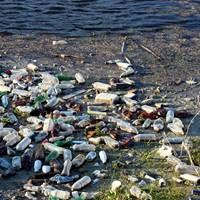(BRUSSELS) – Single-use plastic items such as plates, cutlery or cotton buds, making up over 70% of marine litter, will be banned under plans backed Wednesday in the EU Parliament’s environment committee.
More than 80% of marine litter is plastics. Together they constitute 70% of all marine litter items. Due to its slow decomposition, plastic accumulates in seas, oceans and on beaches in the EU and worldwide. Plastic residue is found in marine species such as sea turtles, seals, whales and birds, but also in fish and shellfish, and therefore in the human food chain.
Under the draft plans from the committee, single-use plastic products such as cutlery, cotton bud sticks, plates, straws, beverage stirrers and balloon sticks will be banned from the EU market from 2021.
MEPs have added to the list very lightweight plastic bags, products made of oxo-degradable plastics and fast-food containers made of expanded polystyrene.
The consumption of several other items, for which no alternative exists, will have to be reduced by member states in an “ambitious and sustained” manner by 2025. This includes single-use burger boxes, sandwich boxes or food containers for fruits, vegetables, desserts or ice creams. Member states will draft national plans to encourage the use of products suitable for multiple use, as well as re-using and recycling.
Other plastics, such as beverage bottles, will have to be collected separately and recycled at a rate of 90% by 2025.
MEPs agreed that reduction measures should also cover waste from tobacco products, in particular cigarette filters containing plastic. It would have to be reduced by 50% by 2025 and 80% by 2030.
One cigarette butt can pollute between 500 and 1000 litres of water, and thrown on the roadway, it can take up to twelve years to disintegrate. They are the second most littered single-use plastic items.
The committee says EU member states should also ensure that at least 50% of lost or abandoned fishing gear containing plastic is collected per year, with a recycling target of at least 15% by 2025. Fishing gear represents 27% of waste found on Europe’s beaches.
Member states would have to ensure that tobacco companies cover the costs of waste collection for those products, including transport, treatment and litter collection. The same goes for producers of fishing gear containing plastic, who will need to contribute to meeting the recycling target.
The report will now be put to a vote by the Parliament’s full House during its 22-25 October plenary session in Strasbourg.
While plastics are a convenient, adaptable, useful and economically valuable material, it is now accepted that they need to be better used, re-used and recycled. When littered, the economic impact of plastics encompasses not just the lost economic value in the material, but also the costs of cleaning up and losses for tourism, fisheries and shipping.
Further information, European Parliament
Single-use plastics and fishing gear: Reducing marine litter (Briefing, 09-07-2018)


